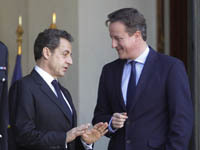European leaders to enforce new changes to fiscal rules
 European leaders were struggling on Friday to cope with the consequences of a profound split over crisis plans for the eurozone, leaving the UK isolated and 23 member states of the European Union determined to press ahead with a new treaty to enforce tough changes to fiscal rules.
European leaders were struggling on Friday to cope with the consequences of a profound split over crisis plans for the eurozone, leaving the UK isolated and 23 member states of the European Union determined to press ahead with a new treaty to enforce tough changes to fiscal rules.
The refusal by David Cameron, UK prime minister, to agree to a full treaty change for all 27 EU members without inserting special safeguards for UK financial services caused a stand-off in the early hours with both Angela Merkel, German chancellor, and Nicolas Sarkozy, French president, according to Financial Times.
Twenty-three of the 27 leaders agreed to pursue tighter integration with stricter budget rules for the single currency area, but Britain said it could not accept proposed amendments to the EU treaty after failing to secure concessions for itself.
After 10 hours of talks, all 17 members of the euro zone and six countries that aspire to join resolved to negotiate a new agreement alongside the EU treaty with a tougher deficit and debt regime to insulate the euro zone against the debt crisis. "Not Europe, Brits divided. And they are outside of decision making. Europe is united," Lithuanian President Dalia Grybauskaite said in blunt English on arriving for the second day of the bloc's eighth crisis summit this year, reports Reuters.
Most EU countries had pushed for an EU-wide accord to avoid a split, but Germany and France, the eurozone's biggest economies, quickly made clear that a deal among the 17 euro countries and whoever else wanted to join was better than nothing. The failure of the EU to get unanimous support for more stringent budgetary rules may rattle the foundations of a union created to foster peace and prosperity across Europe following World War II.
French President Nicolas Sarkozy laid the blame at the feet of British Prime Minister David Cameron. "David Cameron made a proposal that seemed to us unacceptable, a protocol to the treaty that would have exonerated the United Kingdom from a great number of financial service regulations," Sarkozy said shortly before dawn, after what he called a "difficult" dinner meeting had dragged through the night, informs Washington Post.
Cameron has also shored up his position within his own party. Some Eurosceptics were seriously discussing a challenge to his leadership if he came back from Brussels without using his leverage to change UK relations with the EU. The two-tier Europe has been formalised, but few Tory Eurosceptics regard this arrangement as stable. He will be cheered to the rafters by the Eurosceptics when he makes a statement on the summit to the Commons, but some will demand more.
Within a few years they will be demanding a referendum on the UK's departure, arguing there is no point in Britain being a quarter in, three-quarters out. If Tory Eurosceptics did not know whether or not Cameron was truly one of them, they now have their answer. It is a sign of the Conservative's domestic strength that Labour could not bring itself to say Cameron should have signed the deal. The shadow foreign secretary, Douglas Alexander, accused Cameron of burning alliances. He added that UK isolation "was a direct predictable consequence of a shambolic and misconceived negotiating strategy". But for the moment the wind will be in Cameron's sails, says The Guardian.
Subscribe to Pravda.Ru Telegram channel, Facebook, RSS!




